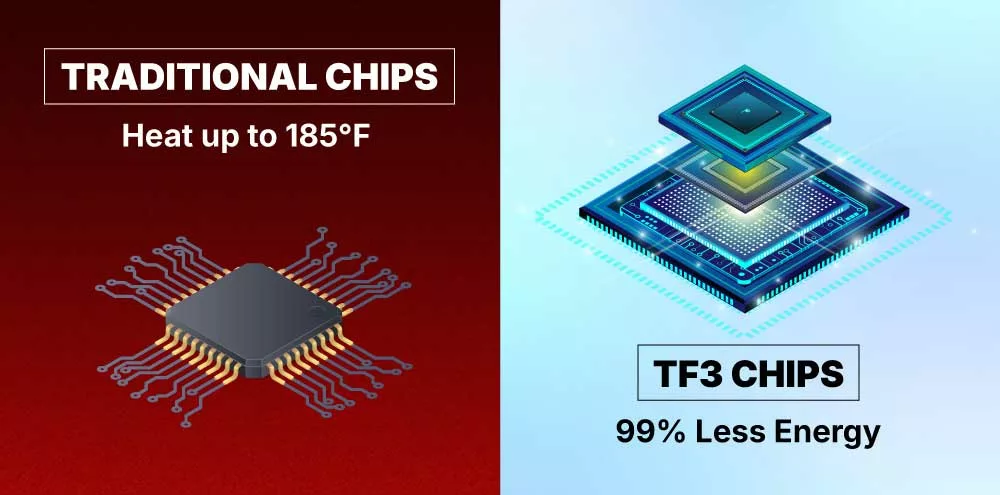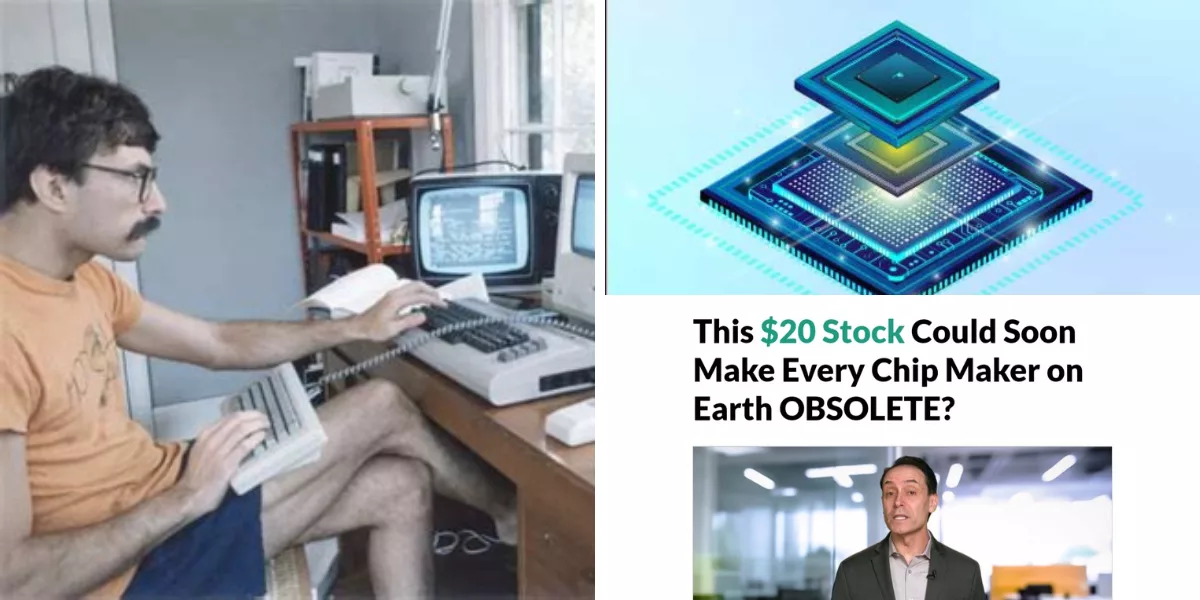There's lots of buzz about quantum computing being the next big thing.
A breakthrough material that is harnessing the raw power of light itself could make it happen sooner than anyone expects and according to Marc Lichtenfeld, one “TF3” Chip Company is behind it.
The Teaser
We've been on a crash course with quantum computing ever since 2019.

However, before we find out why, a word about the presenter, Marc Lichtenfeld.
Marc is the Oxford Club's self-professed “income guy.” His thing is finding companies with rock-solid financials that pay steady dividends year after year.
We have previously covered some of these here, like his Ultra Passive Income Play and Uranium Profit Package, among others.
Back in 2019, Google claimed to have built the first computer to achieve “quantum supremacy“.
Few knew what this meant, but it was able to complete a calculation in 200 seconds that would have taken the best supercomputers at the time an estimated 10,000 years, which admittedly is pretty impressive.
However, in hindsight, it appears there was some bias involved, as a specific algorithm was used that worked better on a quantum machine, than a regular computer.
Whatever the case, until there is a working quantum computer that we the public can buy off the shelf from Walmart, there is nothing!
Well, Marc says scientists may have finally cracked the code on the perfect material to make quantum computing practical.
Not Just Another Tech Trend
It's called TF3 and it holds the potential to change the world, which we'll get into in a bit.
The real reason there is such a big push for quantum computing is because for half a century, every computer on Earth has worked the same basic way.
Electronic circuits flowing through silicon chips. The faster the electricity moves, the faster the computer can process requests.
It's a bit more complex than this, but that's the gist of it.
This has worked just fine…until now.
Today's most advanced silicon chips are already nearing the size of individual atoms, so there's no room left to make them smaller or faster using traditional methods.
It comes at a time when artificial intelligence (AI) has exploded the demand for computing power. Worse timing than a blind man in a Western-style standoff.
Besides the laws of physics, modern chips have two more problems:
1. Delays and inefficiencies as more and more electricity runs through them.
2. They create massive amounts of heat.
The current path isn't sustainable, but TF3 could be the solution.
The Pitch
All is revealed inside a comprehensive report called: “The TF3 Revolution: The Trillion-Dollar Breakthrough and the Hidden Company That Controls It All.“

It includes the name of the company behind the tech and it can be ours with a subscription to the The Oxford Income Letter.
Normally, this costs $249 upfront for the first year, but for a limited time, it has been slashed down to $49, and a bunch of bonuses have been thrown in to get us to buy.
What is TF3 Really?
Marc states that TF3 isn't some small improvement. It's a complete game-changer.
One that makes today's most advanced computers look like old steam engines compared to rocket ships
Some strong words.
The way it is explained is that in order to build truly lightspeed quantum computers you need a very special material.
Up until now, scientists have tried a number of approaches and substances to make photonic systems work. The one that has shown the most promise is Thin Film Lithium Niobate (TF3).
Searching around the web and on research platforms, TF3 appears to be the real deal.
Several sources cite single-crystal thin lithium niobate films bonded on a silica insulating substrate as a “particularly promising platform” compared to standard approaches, such as thermal modulators, micro-electromechanical systems, and high-speed free-carrier modulators.
TF3 is man-made crystal material built at the atomic level to control individual particles of light, which sounds straight out of a Mission Impossible movie.
Remember the bit earlier about chips getting too small? Well, TF3 is precision-built to grab and direct light particles through spaces 10,000 times thinner than a human hair.
It's the essential material that makes lightspeed processing and in turn, quantum computing possible.
The Breakthrough
TF3 also solves the inefficiency and heating problems of current-gen chips.
By sending data as pure particles of light through tiny “highways” built directly into computer chips.
This also means chips run much cooler because light particles create far less heat than electrons.

One company has quietly cornered the market on the materials needed to create TF3 and it's Marc's pick to dominate the burgeoning market. Let's find out what it is.
Revealing Marc Lichtenfeld's TF3 Chip Company
Unlike some recent teasers, Marc didn't hold back in this one and we are flooded with clues.
Here are the most relevant ones:
- It is America’s first and only supplier of TF3, opening and owning the first commercial foundry in Tempe, Arizona.
- A major aerospace contractor placed the first commercial order in December 2024 and NASA has awarded it multiple contracts.
- The company dominated BMW and Amazon Web Services' Quantum Computing Challenge for Vehicle Sensor Placement.
Marc's TF3 Chip Company is Quantum Computing Inc. (Nasdaq: QUBT). The clues align like a comb over.
- Quantum Computing (QCi) built a first of its kind foundry devoted to processing thin film lithium niobate (TFL3) and other transition metal ferroelectrics in Tempe, Arizona.
- The photonics and quantum optics technology company has been awarded a prime NASA contract.
- It's Qatalyst ready-to-run quantum software was selected as one of three finalists for the final round of the BMW and Amazon Web Services Quantum Computing Challenge back in 2021. No mention of it dominating or winning though.
The Next Nvidia?
The quantum computing timeline has changed more than a runway model at a fashion show.
However, all reasonable expectations, assuming a Moore's law exponential growth curve, have the first commercial quantum applications arriving sometime around 2035-2040.
To say that we are early is an understatement, but it's better than being late.
Interestingly, there are more than a few publicly-traded companies (all at the R&D stage) focusing on various aspects of quantum computing, from Quantum Computing-as-a-Service platform, D-Wave Quantum to quantum encryption specialist, Arqit Quantum.
QCi's angle is one of the most promising from an investor perspective, foundational quantum hardware.
In his presentation, Marc likens it to Nvidia, which has supplied the GPU chips powering most of today'sAI applications.
This is what QCi does, supplies the chips every quantum computing company needs.
Orders for such hardware are starting to trickle in from commercial customers like NASA and research institutions, but the reality on the ground is Q2 2025 revenue that totaled $61,000, with a net loss of $8.5 million.
But before we write QCi off completely, it just completed construction of its quantum photonic chip foundry in Arizona in March and early partnerships with blue chip clients suggest that it could have an early advantage in quantum chip solutions.
Back in early 2019, Nvidia shares were selling for less than $4, with a $144 billion market cap. By 2024, it's stock price was sitting above $140.
Today, QCi is valued at just over $2 billion.
No one knows if it will go on to be a 35-bagger like Nvidia over the next five years or ten years for that matter, but wagering a small sum, even if it's just a few hundred dollars, and watching it try will be fun.
Quick Recap & Conclusion
- “Income guy” Marc Lichtenfeld is teasing a breakthrough material that is harnessing the raw power of light itself, and one “TF3” Chip Company is using it to unleash computing power beyond anything we’ve ever seen.
- What's really being teased is Thin Film Lithium Niobate (TFLN), which is widely acknowledged as one of the most promising technologies for fabricating chips capable of quantum computing power.
- Everything, including the name of the company harnessing the tech, is revealed inside a comprehensive report called: “The TF3 Revolution: The Trillion-Dollar Breakthrough and the Hidden Company That Controls It All.” It's ours, if we subscribe to the The Oxford Income Letter for the limited time price of $49 for the first year.
- Fortunately, we were able to reveal Marc's TF3 Chip Company for free, so you can skip the landing page and subscription upsell process. It's Quantum Computing Inc. (Nasdaq: QUBT).
- A strange pick for an “income guy,” as QCi is a sepculative early-stage, pre-income, quantum computing hardware play. This is a long-term hold, if anything, as quantum computing is still a decade away according to most reasonable estimates.
Will quantum computing happen in the next decade? Give us your predictions in the comments.

